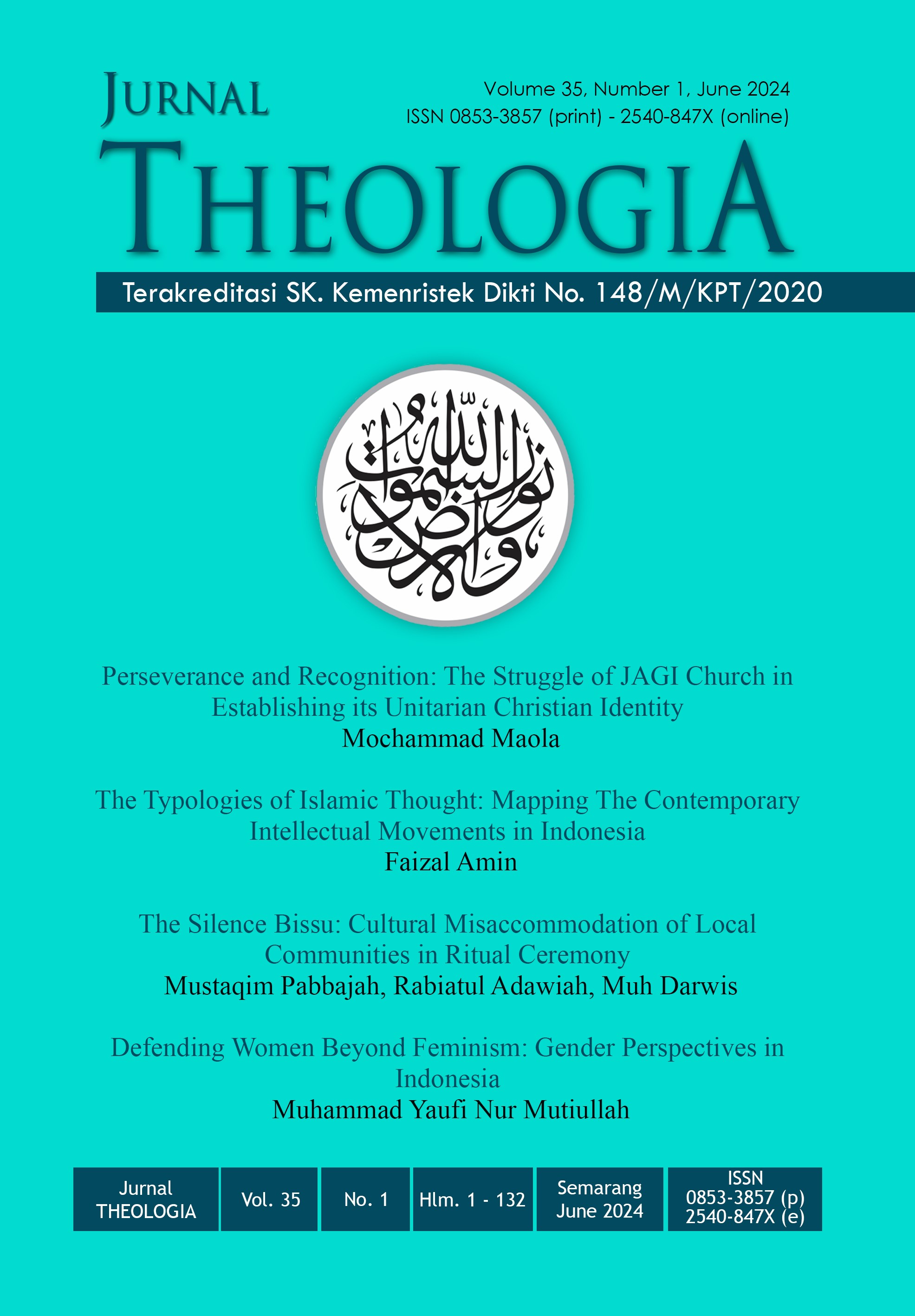Islamic Theological Reflections on Humanitarian Principles Towards Queer: Perspective of Qur’anic Interpretation
DOI:
https://doi.org/10.21580/teo.2024.35.2.21631Keywords:
Theological reflection, humanitarian principles, queer, Qur'anic interpretationAbstract
This research examines the principles of queer humanity in religious teachings written in the Qur'an. This research uses a qualitative literature study method, while the Qur'anic text reading uses Nasr Hamid Abu Zayd's contextual reading method. This study found several findings: First, humans are bound in a primordial covenant with God, and human life's orientation is to recognize God's Oneness. Second, humans are born in a state of fitrah (pure). Third, humans are ethical and moral beings. Fourth, every human person is valuable. Because the principle of humanity is written in the Qur'an, it is appropriate for humanity to have a religious, ethical attitude toward queer people by promoting the principles of justice, tolerance, and equality between human beings. This religious, ethical attitude is a guideline for human life regardless of differences in gender identity and sexual orientation. The principles of humanity in the teachings of Islam written in the Qur'an and hadith place humans, both men, women, and queers, as equal beings before God.
Downloads
References
Al-Razi, Fakhr, al-Tafsir al-Kabir, jilid XV, Beirut: Dar al-Haya al-Turats al-‘Arabi, 1990.
Budianti, Melani, Identitas-Trans, dalam Ekspresi Untuk Identitas, diterbitkan oleh Suara Kita, PKBI dan renebook:2014.
Davies, Sharyn Graham, Keberagaman Gender di Indonesia, Santi Hendrawati dan Catharina Indirastuti (penerjemah), Jakarta: Yayasan Obor Indonesia, 2018.
Fatwa Haram MUI tentang Lesbian dan Gay tahun 2014, lihat https://mui.or.id/storage/fatwa/329ca845b0f58948967b5619afa91325-lampiran.pdf
Hafsin, Abu, Pengantar, dalam buku “Islam dan Humanisme: Aktualisasi Humanisme Islam di Tengah Krisis Humanisme Universal”, Yogyakarta: Pustaka Pelajar, 2007.
Koeswinarno, Hidup Sebagai Waria, Yogyakarta: LKiS, 2004.
Leaman, Oliver (ed), The Qur’an: An Encyclopedia, London and New York: Routledge,2006.
Muhammad, Husein, Refleksi Teologis Tentang Kekerasan Terhadap Perempuan, Dalam Syafiq Hasyim, ”Menakar Harga Perempuan: Eksplorasi Lanjut Atas Hak-Hak Reproduksi Perempuan Dalam Islam”, Bandung: Mizan, 1999.
Muhammad, Husein, Siti Musdah Mulia, Marzuki Wahid, Fiqh Seksualitas: Risalah Islam Untuk Pemenuhan Hak-Hak Seksualitas, diterbitkan oleh PKBI tahun 2011.
Madjid, Nurcholish, Masyarakat Religius: Membumikan Nilai-Nilai Islam Dalam Kehidupan Masyarakat, Jakarta: Paramadina, 2004.
Mulia, Musdah, Mengupas Seksualitas: Mengerti Arti, Fungsi dan Problematika Seksual Manusia Era Kita, Jakarta: Opus Press, 2015.
Murray, Stephen O. The Will Not to Know: Islamic Accomodations of Male Homosexuality, dalam ”Islamic Homosexualities: Culture, History and Literature”, New York: New York University Press, 1997.
Muthmainnah, Yulianti, Hak Asasi Manusia LGBT Dalam Kebijaksanaan Dalam Negeri Indonesia, dalam Jurnal Perempuan “Keragaman Gender dan Seksualitas”, Vol. 20. No. 4 November 2015.
Nadia, Zunly, Waria, Laknat atau Kodrat?, Yogyakarta: Pustaka Marwa, 2005.
Nasr, Seyyed Hosein, The Heart of Islam: Enduring Values for Humanity, New York: Haroer Collins, 2002.
Oetomo, Dede, Memberi Suara Pada Yang Bisu, Yogyakarta: Galang Press, 2001.
Pesantren Waria di Yogyakarta di Tutup, LBH Protes, lihat https://www.bbc.com/indonesia/berita_indonesia/2016/02/160225_indonesia_ponpes_waria_ditutup
Rahman, Fazlur, Major Themes of the Qur’an, Minneapolis & Chicago Bibliotheca, 1980
Roni, Narasi Agama, Negara, dan Heteronormativitas Dalam Mengkriminalisasi LGBT, dalam “Seksualitas dan Agama: Dialog Tentang Tubuh yang Terus Tumbuh”, Yogyakarta: YIFoS Indonesia dan Cantrik Pustaka, 2019.
Saat, Norshahril, Theologians “Moralising” Indonesia: The Case of the Post-New Order Ulama Council of Indonesia (MUI), dalam Asian Journal of Social Science, Vol. 44 No. 4/5, 2016.
Spencer, Colin, Sejarah Homoseksualitas: Dari Zaman Kuno Hingga Sekarang, terj. Ninik Rochani Sjams, Yogyakarta: Kreasi Wacana, 2004.
Sa’abah, Marzuki Umar, Perilaku Seks Menyimpang & Seksualitas Kontemporer Umat Islam, Yogyakarta: UII Press,2001.
Sa’dan, Masthuriyah, LGBT, Agama dan HAM: Kajian Pemikiran Khaled M. Abou El-Fadl, dalam Jurnal Perempuan “Keragaman Gender dan Seksualitas”, Vol. 20. No. 4 November 2015.
Sa’dan, Masthuriyah, Solidaritas Waria Yogyakarta, Yogyakarta: Gading Publishing, 2021.
Sa’dan, M., Merebut Ruang Ibadah: Studi Kasus Konflik Penutupan Paksa Pondok Pesantren Waria Al-Fatah Yogyakarta. Jurnal Tashwir, 10(2), 2022.
Safri, Arif Nuh, Memahami Keragaman Gender dan Seksualitas: Sebuah Tafsir Kontekstual Islam, Yogyakarta: Penerbit Lintang, 2020.
Umar, Nasaruddin, Argumen Kesetaraan Gender Perspektif Al-Qur’an, Jakarta: Paramadina, 2001
Wahid, Wawan Gunawan A., Perilaku Homoseks Dalam Pandangan Hukum Islam, dalam Jurnal Musawa UIN SUKA Vol.2. No.1 Maret 2003.
Waliko dkk, Contextualizing Hadith on LGBT in The Perspectives of Humanity, Religion, and Culture, Jurnal Ilmu Ushuluddin UIN Syarif Hidayatullah, Vol. 10, No. 2, 2023.
Wehr, Hans, A Dictionary of Modern Written Arabic, ed. J. Milton Cowan, Edisi III, New York: Spoke Language Services,1976.
Zayd, Nasr Hamid Abu, Rekonstruksi Gender: Kritik Wacana Perempuan dalam Islam, terj. Moch. Nur Ichwan dan Moch. Syamsul Hadi, Yogyakarta: SAMHA, 2003.
Downloads
Published
How to Cite
Issue
Section
License
Copyright (c) 2024 Jurnal Theologia

This work is licensed under a Creative Commons Attribution-NonCommercial-ShareAlike 4.0 International License.




















